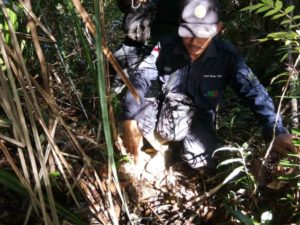In this latest update from Kerinci Seblat National Park, the FFI team tell that despite the current health crisis, antipoaching patrols took place in all but 4 weeks between February to July 2020. April was the worst-hit month and May saw some disruption due to travel restrictions. Nevertheless, the units carried out 52 foot-patrols covering 812 km and remarkably they recorded 44 instances of evidence of Sumatran tigers on their patrols with 56% of patrols reporting one or more tiger present on their routes.
One of the units most import roles is removing active tiger snares from the forest, both as a result of gaining intelligence and by searching known hotspots. During this reporting period, 9 active or recently active tiger snares were discovered. Sadly one of them had caught a Malay sun bear. Of the rest, four snares were the result of information and the TPCUs subsequently identified the individuals suspected of being responsible.
Wildlife crime investigations are detailed and long-term and the evidence needs to be gathered and a case painstakingly put together. This report shows how evidence is graded by credibility and reliability. Only when certain, do the TPCUs working together with the local police department, launch an enforcement action. At the end of July, an intelligence-led wildlife crime law enforcement action was conducted resulting in the arrest of three men from West Sumatra and North Sumatra provinces in possession of 20kg of pangolin scales. (https://www.fauna-flora.org/news/scales-critically-endangered-pangolin-seized-sumatra). These men were known to be traders in tigers, pangolin and hornbills.
Read the full report here to find out more about this project




